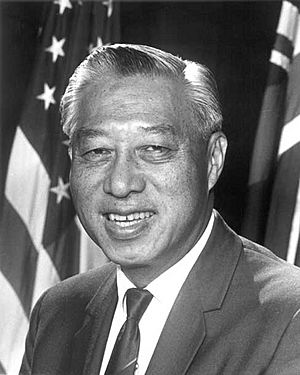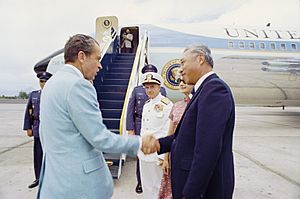Hiram Fong facts for kids
Quick facts for kids
Hiram Fong
|
|||||||||||
|---|---|---|---|---|---|---|---|---|---|---|---|
 |
|||||||||||
| United States Senator from Hawaii |
|||||||||||
| In office August 21, 1959 – January 3, 1977 |
|||||||||||
| Preceded by | Seat established | ||||||||||
| Succeeded by | Spark Matsunaga | ||||||||||
| Speaker of the Hawaii House of Representatives | |||||||||||
| In office 1948–1954 |
|||||||||||
| Preceded by | Manuel Paschoal | ||||||||||
| Succeeded by | Charles E. Kauhane | ||||||||||
| Member of the Hawaii House of Representatives from the 5th district |
|||||||||||
| In office 1938–1954 |
|||||||||||
| Personal details | |||||||||||
| Born |
Yau Leong Fong
October 15, 1906 Honolulu, Territory of Hawaii, U.S. |
||||||||||
| Died | August 18, 2004 (aged 97) Kahaluu, Hawaii, U.S. |
||||||||||
| Political party | Republican | ||||||||||
| Spouse |
Ellyn Lo
(m. 1938) |
||||||||||
| Children | 4 | ||||||||||
| Education | University of Hawaii, Manoa (BA) Harvard University (LLB) |
||||||||||
| Occupation | Businessman, lawyer, politician | ||||||||||
| Military service | |||||||||||
| Allegiance | United States | ||||||||||
| Branch/service | |||||||||||
| Years of service | 1942–1945 | ||||||||||
| Rank | |||||||||||
| Unit | • Seventh Air Force |
||||||||||
| Battles/wars | World War II | ||||||||||
| Chinese name | |||||||||||
| Traditional Chinese | 鄺友良 | ||||||||||
| Simplified Chinese | 邝友良 | ||||||||||
|
|||||||||||
Hiram Leong Fong (born Yau Leong Fong; October 15, 1906 – August 18, 2004) was an important American businessman, lawyer, and politician from Hawaii. His father was an immigrant from China who worked on a sugar plantation. Hiram Fong made history as the first Chinese-American and first Asian-American to become a United States Senator. He served in the Senate from 1959 to 1977.
In 1964, Fong was the first Asian-American to receive votes for president at a major political party meeting. As a Senator, he strongly supported laws that protected civil rights and helped remove old rules that limited immigration based on a person's background. Hiram Fong is the only Republican to have ever been a senator from Hawaii.
Contents
Early Life and Education
Fong was born in Honolulu, Hawaii, in a neighborhood called Kalihi. He was the seventh of 11 children. His father, Fong Sau Howe, came from China in 1872. He was one of many immigrants who came to Hawaii to work on sugar plantations.
Hiram started working at a very young age. By age four, he was picking beans for cattle. When he was seven, he worked as a shoeshiner, cleaning shoes for money.
He went to public schools in Hawaii. He graduated from McKinley High School in 1924. Later, he earned a degree from the University of Hawaii at Manoa in 1930. In 1935, he earned a law degree from Harvard Law School.
Early Career
Legal and Military Work
After finishing law school, Fong returned to Hawaii. He worked for the Prosecuting Attorney of Honolulu. In 1938, he started his own law firm. He changed his name to "Hiram" in 1942. Some say he chose the name to honor Hiram Bingham I, an early Christian missionary in Hawaii.
During World War II, Fong served in the United States Army Air Forces. He worked as a Judge Advocate, which means he was a lawyer for the military. He later retired as a colonel from the United States Air Force Reserve.
Hawaii Politics
In the same year he started his law firm (1938), Fong began his political career. He was elected to the Hawaii Territorial House of Representatives. Hawaii was a U.S. territory at that time, not yet a state. He became the Speaker of the House from 1948 to 1954. During this time, he was a key leader in the effort to make Hawaii a U.S. state. He also attended the 1952 Republican National Convention as a delegate.
Fong left the legislature when the Democratic Party of Hawaii gained more power. After leaving politics for a short time, he started several businesses.
Business Ventures
In 1952, Hiram Fong helped start Finance Factors. This was one of the first companies to offer loans to people and businesses in Hawaii. It helped many minority groups start new businesses and buy homes.
United States Senate
Hawaii became a U.S. state in 1959. Hiram Fong became one of Hawaii's first two U.S. Senators. He served with Oren E. Long, a Democrat.
Fong was known as a moderate Republican. This means he often agreed with both Republicans and Democrats on different issues. He supported many of President Lyndon B. Johnson's "Great Society" programs. These included the creation of Medicare in 1965, which helps older people with healthcare costs.
Fong won his first Senate election in 1959. He was reelected in 1964 and again in 1970. In 1976, he decided not to run for reelection and retired. Spark Matsunaga took his place.
Party Politics
Hiram Fong was honored twice by the Republican Party. He was a "favorite son" at the Republican National Conventions in 1964 and 1968. In 1964, he became the first Asian American to receive votes for president at a major party convention.
In 1960, Richard Nixon visited Hawaii. He said that "the American dream is not just a dream, it does come true – Hiram Fong's life proves it."
Civil Rights and Immigration
Senator Fong strongly supported civil rights. He voted for the Civil Rights Acts of 1960, 1964, and 1968. These laws aimed to end discrimination based on race, color, religion, sex, or national origin. He also supported the 24th Amendment, which made it illegal to charge a tax to vote.
Fong also supported the Voting Rights Act of 1965. This law helped protect the right to vote for all citizens. He even wrote an amendment to allow poll watchers to help make sure elections were fair. Additionally, Fong voted to approve Thurgood Marshall to the U.S. Supreme Court. Marshall became the first African American Supreme Court Justice.
In 1965, Fong helped discuss the Immigration and Nationality Act of 1965. This important law changed how people could immigrate to the U.S. It removed old rules that favored immigrants from certain parts of the world.
Foreign Policy
During President Nixon's time in office, Fong supported the Vietnam War. This was a difficult issue and some people in Hawaii who were Asian-American were not happy about his stance. His support for the war may have caused him to lose votes in his last reelection campaign in 1970.
Personal Life and Legacy
Hiram Fong married Ellyn Lo in 1938. They had four children. After retiring from the Senate, they managed a large botanical garden. This garden, which was about 725 acres, opened to the public in 1988.
Hiram Fong passed away on August 18, 2004, at his home in Honolulu. He was a Congregationalist. He was buried in Nuuanu Memorial Park and Mortuary.
Images for kids
See also
- List of Asian Americans and Pacific Islands Americans in the United States Congress
 | May Edward Chinn |
 | Rebecca Cole |
 | Alexa Canady |
 | Dorothy Lavinia Brown |




